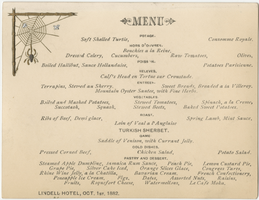Search the Special Collections and Archives Portal
Search Results
Edwin "Tony" Wuehle oral history interview
Identifier
Abstract
Oral history interview with Edwin "Tony" Wuehle conducted by David Schwartz on December 21, 2006 for the Boyer Early Las Vegas Oral History Project. In this interview, Wuehle discusses his early life in Hettinger, North Dakota and his career as an educator. He recalls his first experiences playing poker, participating in home poker games while living in Michigan’s Upper Peninsula, and using a pseudonym as a player. Wuehle then talks about writing a book, founding the Gamblers Book Club Press in Las Vegas, Nevada, and writing for religious publications. Later, Wuehle explains the tension between participating in religion and playing poker. He describes Las Vegas poker rooms during the 1960s and 1970s and shares his thoughts on online poker. Lastly, Wuehle discusses why casinos use prop players and his efforts to organize a poker tournament to raise funds for Bay de Noc Community College in Michigan.
Archival Collection
Las Vegas Jazz Society Records
Identifier
Abstract
The Las Vegas Jazz Society Records (approximately 1975-2003) are comprised of organizational records including meeting agendas, minutes, and membership statistics of the Las Vegas Jazz Society (LVJS). Included in the collection are issues of the LVJS's newsletter Jazz Notes, promotional materials, blank membership applications, correspondence, information on other regional jazz societies, and photographic prints depicting various events and festivals. A portion of this collection documents LVJS's involvement in saving the KUNV 91.5 FM radio station.
Archival Collection
UNLV Libraries Collection of Binion’s Horseshoe Hotel and Casino Promotional and Press Materials
Identifier
Abstract
The UNLV Libraries Collection of Binion’s Horseshoe Hotel and Casino Promotional and Press Materials includes clippings, press kits, press releases, and promotional materials dating from 1963 to 2004 for Binion’s Horseshoe Hotel and Casino in Las Vegas, Nevada.
Archival Collection
UNLV Libraries Collection of Peppermill Casinos Incorporated Promotional and Press Materials
Identifier
Abstract
UNLV Libraries Collection of Peppermill Casinos Incorporated Promotional and Press Materials includes clippings and promotional materials for Peppermill Casinos Incorporated properties in Reno, Nevada, Las Vegas, Nevada, and Mesquite, Nevada, dating from 1984 to 2007.
Archival Collection
Hal Rothman Faculty Papers
Identifier
Abstract
The Hal Rothman Faculty Papers (approximately 1930-2006) are comprised primarily of research, teaching, and professional papers of Hal Rothman, professor of history at the University of Nevada, Las Vegas (UNLV). The papers include Rothman's research notes, manuscript drafts, conference articles, lecture notes, audiovisual material for his book
Archival Collection
Alan Copeland Music Scores
Identifier
Abstract
The Alan Copeland Music Scores are original handwritten music scores arranged by American composer Alan Copeland from approximately 1936 to 2004. Copeland worked with various musicians and groups, such as Les Brown, the Modernaires, and Sarah Vaughn.
Archival Collection
Phillip L. Cook oral history interview
Identifier
Abstract
Oral history interview with Phillip L. Cook conducted by Richard Strahan on March 3, 1977 for the Ralph Roske Oral History Project on Early Las Vegas. Cook first talks about his parents' move to Nevada and discusses how the school system has changed over time. He then describes the first businesses that opened up in the Downtown and Strip areas of Las Vegas, Nevada before discussing prostitution, Block 16, and recreational activities available to youth. Cook also talks about the first television sets and telephone systems made available, and he moves on to talk about the prices of things such as movies and haircuts when he was younger. The interview then moves to discussions on the Old Ranch, racial discrimination, school integration, the crime rate, and the school system in Las Vegas.
Archival Collection

Lindell Hotel, menu, October 1, 1882
Date
Archival Collection
Description
Text

Transcript of interview with Frankie Perez by Elsa Lopez and Laurents Bañuelos-Benitez, November 5, 2018
Date
Archival Collection
Description
Frankie Perez (1986- ) is an individual that constantly found himself navigating two worlds, whether it was military versus civilian; female versus male; or being Latinx in the United States. As a result of this navigation, Perez has a unique perspective on our ever more complicated world that not many individuals possess. Perez served in the military during the Do Not Ask, Do Not Tell policy which made it difficult for someone dealing with gender identity, to seek out the proper support they need. Despite the policy, and other policies that were put in place afterwards to inhibit the transgender community in the military, Perez began his transition while still serving his country. In direct contradiction of popular opinion, Perez discovered that the military easily accommodated his transition. Outside of the military Perez is an active voice in the LGBTQ community. As a member of the LGBTQ, Latinx, and military community, Perez has a unique perspective that he uses to fight for both LGBTQ and Latinx rights. Currently, Perez is finishing his degree in gender and sexuality studies at UNLV. He hopes to use his education to help people have the difficult discussions and improve conditions for his communities.
Text

Meeting minutes for Consolidated Student Senate University of Nevada, Las Vegas, April 13, 1989
Date
Archival Collection
Description
Text
